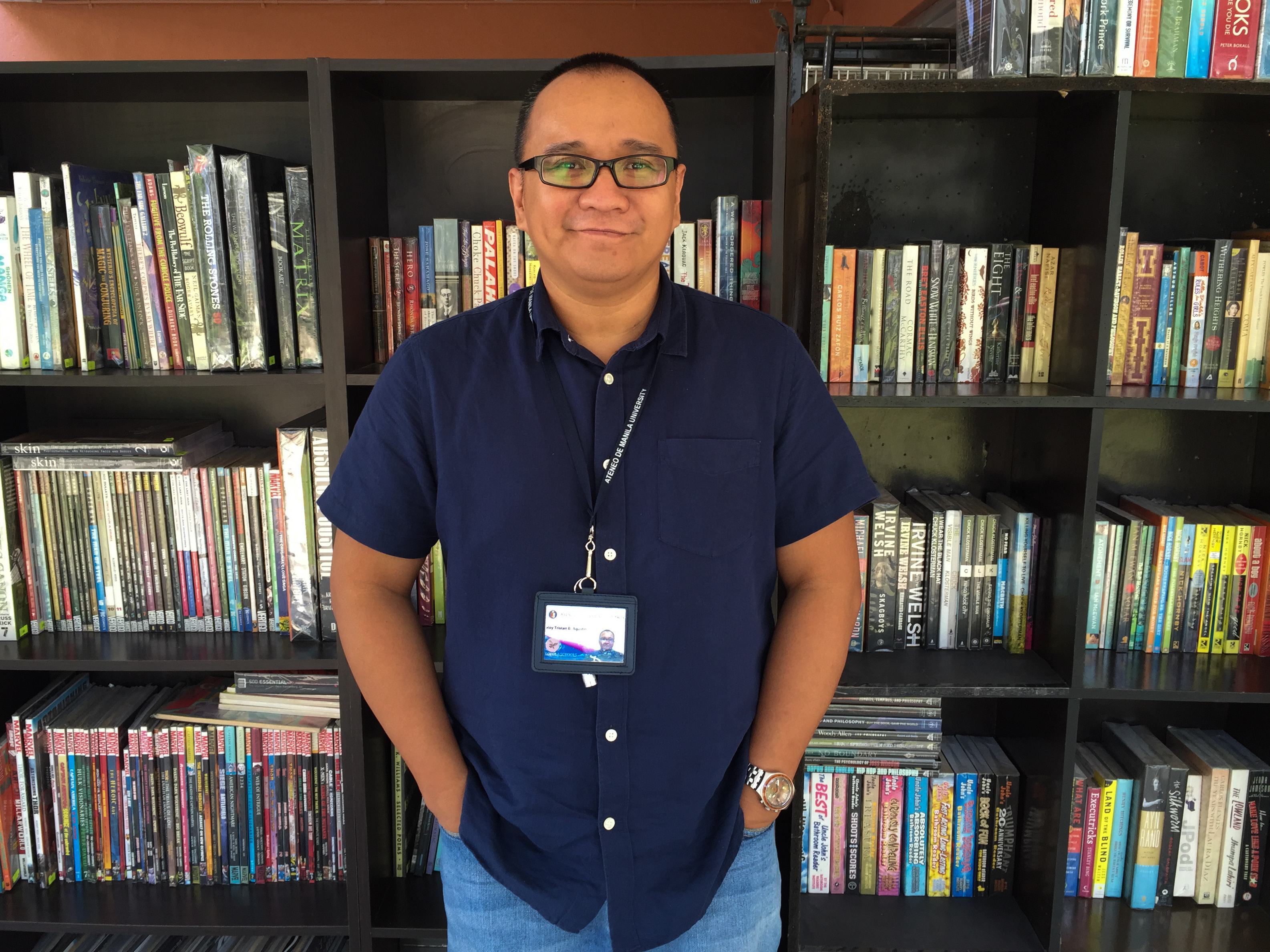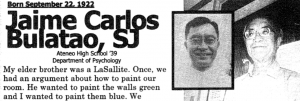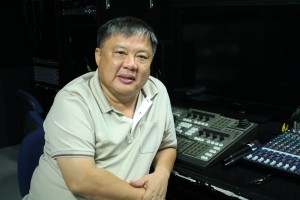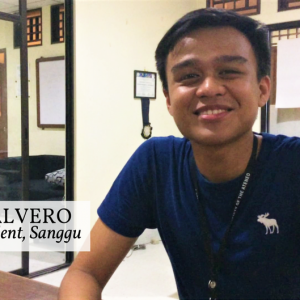Joel Lim and Clarissa Chua entered the English Department to interview Prof. Roy Agustin for Teachers’ Appreciation Week.
Joel Lim (JL): What inspired you to become a professor in Ateneo and to teach English and Literature?
Roy Agustin (RA): Well, the story there actually is weird, because I was actually not planning to teach. I was taking up Master in Literature because I wanted to write, and what happened was, at the time when I entered, there was a shortage of English teachers, because a lot of them had either resigned or were off overseas to study. They desperately needed people who could teach, and they asked me, “Hoy, try it lang, please.” And there, I tried it, and I figured, “Hey, this is not bad.” I enjoyed it, so figured, “Okay, let’s keep going.”
JL: What was the strangest, the funniest, the most memorable moment you’ve had during class?
RA: Trying to remember, because there’s a lot of weird stuff that happen in class. This year? Wala pa naman, mabait pa sila, eh. Wala pa naman.
JL: Or us…
RA: You? Your class?
Clarissa Chua (CC): Notorious, sir. (laughs)
JL: I don’t know, we’re not that notorious except for “the Gambling Ring”.
RA: Yeah, they were playing pusoy all the time. What were the weirdest things that happened in my class…
I remember one time somebody, and this is—sorry, if it’s toilet humor, but it’s true—somebody farted and… that in itself is okay. I mean, people fart. But this dude was, unfortunately, talking to someone, and he had raised his legs. So he was sitting with his, with one foot in the back of the other one, like this (demonstrating) and it was up. He was talking, and I think he was bending over to reach for something, and I guess the bending-over caused pressure, and so, he let one out. And it was damn loud. Right? So it’s prruuutttt and, you know, for a brief second everybody’s trying to keep their composure, right? But, at same time, how could you, ‘di ba? And then I think there was a smell, so people just started to lose it. It was like this wave. It begins there, the center’s the guy. And the wave just spreads as people realize what the hell is happening and for a full 5 minutes, we couldn’t do anything except laugh, because nga. And the poor guy was red, you know, and he still had his leg up and it was just like… the most embarrassing thing, but at the same time, what can you do?
That’s one. That was one of them. The other one was, I think, Ireally, really thought she was high in my class. It was a student I had, who, it was 7:30 in the morning, looked (contorts face to look stoned, or dead tired). You know the look?
CC: Yeah.
RA: Zombie! She was a zombie. And I really thought she was high, because she would answer and be incoherent and all of that, and apparently, she had pulled an all-nighter the night before, andshe hadn’t gone home. From whatever project she was doing, she went straight to class, and she was so, so sleepy. She looked high, and I was actually going, “Did she smoke something?” And I’d be like, “No, because she’s a member of the student council so, it cannot be. Like, what happened?” And she was, like, (mimics sleepy voice) “Sir, I’m sorry, I’m so sleepy…” and then she kind of wovolvov… mumbles out… vovovovolvol… Oh my god.
So ‘yon, those are two. A lot. There’s a lot more.
JL: There’s a lot of colorful things in the Ateneo. So speaking of that, you’ve talked about different types of students. You usually tell various stories to your students before, like back when you were still teaching us, you would talk about UAAP standings…
RA: Yes, I still do.
JL: …life in Ateneo back in the day, like when you were younger, and geek culture, like when you talked about Guardians of the Galaxy with us. What motivated you to make this a regular thing in class?
RA: For one, to me, it’s very important that, for a student to learn, the student has to latch onto something that he or she either likes or is interested in. And to me, geek culture is one, ‘cause a lot of you guys are geeks, and I am a geek. (CC points to JL) Well, he’s (referring to JL) a geek.
CC: (whispers, referring to JL) Number one.
RA: But I, (laughs), but I am a geek and I share that because I do know you guys enjoy, like, Guardians of the Galaxy and stuff like that. And I enjoyed myself and it’s my way of connecting, because to me as a teacher, I need to connect with the students, so that I can both teach effectively, so that I can find out, you know, [so that] I can understand the student better, you get it? There should be a connection.
CC: (simultaneous with RA) A connection…
RA: A relationship.
CC: Like a click.
RA: Yeah, if you don’t, kasi, it’s very difficult. I’ve had classes like that where there’s just… there’s nothing. It’s very difficult for you to get motivated to teach for one, the other one is… the classes where I don’t know if they’re learning anything, because they’re not engaging, they’re not asking me questions, they’re not talking so, “Are you actually understanding?” and yet, some of them are like, “Yeah we do!” and then like…
CC: “Really?”
RA: (confused face) “How? How do I know?” That’s one. As for the stories about days long ago, thank you… (laughs)
CC: I didn’t say anything (referring to JL calling it the old days earlier in the interview).
RA: For “the olden days”… I actually I do the same thing for the UAAP because I think that if there’s one thing that all of you guys have in common, it is when basketball season starts. Everybody’s monitoring the team. Everybody’s watching the team.
JL: We lost… (referring to AdMU’s recent loss to FEU)
RA: (referring to JL) Shaddap. (All three laugh) I watched the game, man! I’m like, holy crap, I’m glad I’m not Fr. Dacanay when I check quizzes.
Imagine what happened to Fr. Dacanay’s quizzes over that game! Kawawa ang mga estudyante no’n! Walang lead! Kawawa sila! Anyway, that’s one way of relating to students and making the students engage. One thing you want to do as a teacher is to make sure your students are engaged with you so that when you do deliver the lecture, or do deliver the lesson, it’s clear that they are paying attention. That’s one reason why I do it.
As for that stories of long ago, and all of that, I guess it’s because, to me, it’s still fascinating to see how things have changed. And it would be interesting for the students to know how things were, and how things have changed. You can’t know it, ‘cause you weren’t here in the time in the past but the changes in the school are profound, and that’s something I think you don’t appreciate if you just came in. You can only appreciate it if you’re an old timer like me, who’s been here for a while, and…yeah. Ugh!”
JL: (sings “A Song for Mary”, school song of AdMU) We staaaand on a hilllllll…
RA: God, the hymn song in the morning kills me every time.
JL: Even in the afternoon.
RA: No naman. In the afternoon, okay lang, nandito ako ro’n eh. I have an 8:30 class, and that song comes out right before my class and I can’t talk until it’s done. It’s a long song pa, and—as I’ve said I’m True Blue—I’ve heard that since I was six freaking years old! (RA exhales, JL & CC laugh) As in, I wanna set fire to things when I hear that song. But there, so that’s why I kind of share Ateneo, and I guess that’s my way of sharing the traditions that we value. There are some things that change, but there are some things that still stay the same.
CC: Like the song. (laughs)
RA: Ugh… the song, the spirit. Right, the Ateneo spirit is still the same, and I guess, the work. The work hasn’t changed. I mean, it’s not harder now; it’s not more demanding now. The work level, the degree of rigor that is demanded of the school is the same. Right? That’s something that I realize is a unique trait of this school. It is a very demanding school. And therefore what do you have to rely on for tradition? (switches to high student voice) “I’m doing this because everybody else did it. Magis. (acts out crying action) Huhu.” All right, so what else?
JL: What is one thing that you want your students to learn, like an idea, a concept. What’s the one thing that you want…?
CC: Like if they only remember one thing that’s like…
RA: “Love to learn” could be the one thing. At the end of the day, if you leave school, you don’t remember a damn thing about that’s happened—I know people who are like that; “I come out of school and I know nothing.” Right? Because they really just studied for the quiz or for the test and then they leave it and then they throw it out, then it’s gone. But, if you have, at the end of the day, an interesting learning, then you will keep improving as the days go by, even if you’re not in school. And to me, that’s the most important thing, because. And quite frankly, you know, as I get closer and closer to calling myself “old,” and I know people who are officially “old,” and I realize it’s their love of learning that will usually determine whether they will continue to stay young or get old. Right? The people who love to learn that will read, that will do stuff—they’re the ones who stay young. And I know people who are like that. I mean, one of my close friends in aikido got her black belt last year. She was sixty-four.
CC: Wew.
JL: Is this the one who always kicks your ass in aikido, or was that someone else?
RA: That was someone else. She also got her black belt last year. (Laughs) But the thing is nga for her, for that colleague of mine, she’s retired now obviously. She doesn’t look sixty-four. She looks my age! You see her, if you see her, she’s sexy, sexy. She has a figure; she has black hair. She doesn’t have wrinkles on her face. She’s toned. She looks forty; she’d pass for forty! And she’s sixty-four! And I was asking her why? Wala. Because she constantly, she loves, that’s why she’s continuing her aikido. She never finished it; she’s doing it until now. Right? Yung ganoon. Yung you constantly want to grow and that’s what I want students to have. At the end of the day, just have that desire and you will find a way, whatever way it is, you will find a way.
JL: I believe this comes from your natural instinct as a teacher ‘cause you know, loving to learn. But as a professor here, especially here in the Ateneo, what is teaching for you?
RA: If you go by, I guess I have to do the Ateneo thing ‘cause Ateneo taught me how to teach. So, to me, teaching is, you’ve heard this before, teaching is letting the students learn. Right? I’m sure you’ve heard of student-centered learning somewhere in your lives in this school because that’s what Ateneo’s supposed to espouse that you allow the students to learn that the teacher is not there to shove knowledge down their heads. The teacher’s kinda there to show them the knowledge. Bahala kayo, how to get it because the logic there being there that if you, if the student learns by himself or herself, they cherish it more. The learning is more special to them.
CC: Hard work.
RA: Yeah, because you work for it, number one. Number two is you discovered it. The teacher didn’t shove it down your throat. You learned it. You picked it up. It’s something you own. And I think that’s the point of student-centered learning and I would agree with that, I think. I’m a very rebellious person. I do not like getting told what to do. I do not like getting ordered around which I think is a problem when I was in corporate. But… (laughs) that’s what I try not to do in class. I try to avoid ordering people around as much as I can. Instead, it’s here it is, here’s what you’re supposed to learn, up to you to pick it up. But know that you’ll be tested for it later on. So if you don’t pick it up, ehhh, that’s your problem. Di ba? But I think it’s that. Ateneo kind of espouses that student-centered learning thing, and it’s a Jesuit thing as well, that they want to learn of their own accord. That’s teaching to me, guiding someone towards that.
JL: Especially teaching is not an easy thing, especially like…
RA: Huhuhu.
CC: (Jokingly.) What’s with the reaction?
JL: But then like, you also do different things like you’re a father and you’re also like an aikido practitioner and so how do you balance life like inside and outside Ateneo?
CC: Student tips 101.
RA: The nice thing about teaching is there is more time to balance. Not that you have a lot, but let’s say, comparing it to a nine-to-five corporate job, where you’re there literally eight o’clock to six o’clock and you can’t really do anything else. Here, I teach three times a week, and I’m here the whole day on Monday, Wednesday, Friday and normally I’m here on Tuesdays and Thursdays, but at least, Tuesdays and Thursdays, what I do is under my control. Do I write? Do I do my other stuff for the school? Do I have to work with my son? Do I have to organize something for the aikido club? Things like that, it’s easier to manage, in that sense, of course, the payoff is that you aren’t paid as much as people in corporate. But that to me is the thing. Teaching affords me that kind of…
JL: Freedom?
RA: Yeah, freedom to adjust the schedule. It doesn’t mean I’m free. Doesn’t mean I have, I can bum around and sit in the house and play video games all day. I can’t. But! At least, I have the decision, I can choose what I can do. Do I write? Yun nga. I have other things to do. Good Lord.I’m up to my eyebrows right now with work. But what I do, when I do it is my control, except for the class times. So ‘yun, and actually nga, when you think about it, teachers do more work than people in corporate because we bring it home. So like the papers, we don’t check it here; we bring it home. Especially since haunted ‘to, di ba? (JL and CC laughs)
RA: (To the voice recorder) Rumor, haunted daw ‘yung English department. (Back to the question) Yeah, so you bring stuff home, you prepare at home, usually. Right? It is, to a degree, you don’t pay a teacher for that time; that’s something a teacher does by himself.
JL: So it’s very admirable that it’s something that you bring home, takes up a lot of time, but then it’s kinda worth it especially when you see students become more cultivated.
RA: It’s fun. That’s one of the things that’s kept me here, I mean, I watch you guys and for the most part kasi, I teach freshmen so I see you guys, you come in, you’re like 16 or 17 or 18 and you’re these bright-eyed kids.”
JL: Clueless people. (laughs)
RA: Right, and then I see you transform. And yet the first transformation is from the bright-eyed kids to real haggard people but then again in the years, you become second year, third year, I see you guys mature. I see you guys change; physically, you change and your physical demeanor changes. You’re not awkward anymore. By third year pa lang di na kayo awkward eh, you’re already confident na when you walk. You know the place; you know everything and that to me is interesting. It’s fun and eventually, you guys leave. You graduate and strangely enough a lot of you pop back here.
(JL & CC laugh)
RA: I have a bunch of students who are teachers now. It’s like okay? Okay, great. On one hand, great, welcome to the club. On the other hand, why are you here?
(JL & CC laugh)
RA: But yeah, there, that’s fun for me. It’s very interesting that I see all these people change.
JL: And especially students, there’s a lot of learning experience so for you. Wwhat was the most important thing or one thing you’ve kinda learned from your students, either directly or indirectly?
RA: It would be that you can’t not take them seriously. I like to joke around in class, you know that. But I do take every student’s concern seriously because even if for me, let’s say ah, I’m old and your concern’s like, sir, my test is ganyan. To you, that’s important, right? To me, I kind of have to bring myself back, and it gets harder and harder the older you get. You have to bring yourself back in time when you were that student. And you needed that kind of support or help or whatever. So it’s that. It reminds me of what it was like to be your age. Di ba? To a degree, I’m sure some of them will say, it keeps you young.
CC: Yeah, my prof said that.
RA: Because you have to engage with the students and the students are… it’s like talking to an immortally young kid just that the kid changes and so you have to stay young. That’s why the Jesuits, look at them. They don’t age!
JL: Fr. Jett.
RA: Fr. Jett is di ba? He looks really young! And Fr. Dacanay doesn’t look like he ages. Right? So ‘yung ganoon.
JL: One last thing, so ultimately… what is your advice for students?
RA: Get out of the school.
(JL & CC laugh)
RA: No, seriously, get out of the school! Right? When you graduate, the worst thing you can do for yourself is to stay here. Right? I will never recommend that straight out of school you work and then that’s your career tapos you learn… Well, there’s a good portion of the world that you’ll never know. And that’s something you should know. Get out. Go, do something! Don’t be in Ateneo. Why? I did that, I went out for a while, so… I’m here and when I come back, iba na ‘yung point of view ko. I’m gonna go out again at a certain point.
JL: So, it’s like, explore outside…
RA: Yeah. Learn, man. This place… the thing about Ateneo is that it’s so nice. So nice, and it’s so comfortable and it’s so cushy that—and this is true of any batch—if someone feels bad, if someone is at a low point in their lives, they will normally come here.
JL: Ah, ‘cause it’s so serene, with the trees, and all.
RA: Yeah, even in career wise, let’s say, you don’t have a job, you will teach, kahit one sem lang. It’s just to reset, right? To reset, to reestablish yourself and to put down your roots again. I know a lot of people who have done that. Or sometimes, yeah, sometimes, people just pop up and just sit or eat. Right? They’d sit around the quadrangle and just soak in the trees. But the point is, there’s that, and the word I use is sanctuary, and that Ateneo is a sanctuary for people especially when you’re out. That if you need peace of mind, you come back here. You attend mass. You sit; you talk to your priest friend whoever he is. You come out, oh, you’re back na. That’s the nice thing about this place. And that’s something that you guys have as students. This is a sanctuary for you. This’ll always be sanctuary for you. Okay? 20 years down the line, you can come back, sanctuary pa rin.
JL: But ultimately, we have to go out.
RA: You should. You should go out. The creepy thing here is 20 years down the line, the teachers are still here. And they haven’t aged.
(JL & CC laugh)
RA: You’ll start to wonder, right? I’m kidding. That’s it.
JL: Alright. Thank you, sir!
CC: Thank you, sir!
RA: You’re welcome!
JL: It’s been an honor to see you again.
RA: It’s been an honor, like we haven’t seen each other before.




